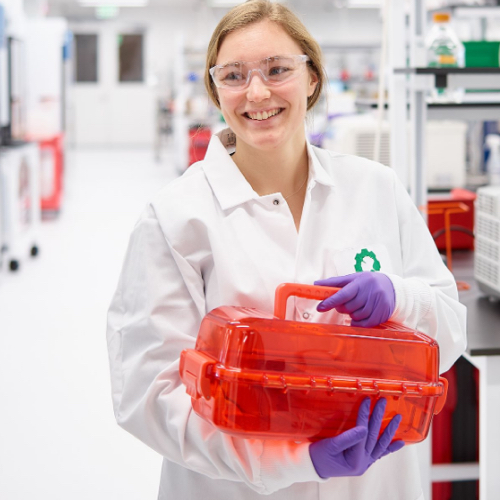Ginkgo Ferment 2023, Platform Presentation:
Ginkgo’s Head of Protein Engineering, Emily Wrenbeck, PhD, shares how our foundry makes it possible to generate valuable data that drives enzyme discovery and optimization.
Watch the full presentation here or read below for a summary.
At Ginkgo, we understand the value of data in biological engineering.
We source natural libraries of proteins through public and proprietary sequence databases. And we’ve built a broad computational protein design toolkit that includes classic methods like molecular dynamics and Rosetta. We also use the latest AI models for protein predictions, including AlphaFold and EVcouplings. Our Protein Production Services allow us to take a supervised machine learning approach to protein design, which means we train models directly on the experimental data that we generate in the process.
What does all of this look like in practice? Here’s an example:
- A customer asked Ginkgo to optimize an enzyme that was critical to their project. The challenge? The enzyme was known to be difficult to engineer, due to its recalcitrant nature and unsolved reaction mechanism. In this case, traditional rational protein engineering approaches were not feasible.
- To tackle this problem, Ginkgo opted for a data-driven approach to protein design. We engaged in four rounds of Design, Build, Test, and Learn. In the early rounds, we used a design toolkit with sequence-based, self-supervised model active sign mutagenesis and Rosetta docking to explore the sequence to activity relationship of the protein.
- In the successive rounds, we fed all the data into our platform to train models and build designs. The library sizes in the final round were able to realize a big leap in performance with a rather small library. As the models are given more data, they get more predictive, enabling us to hit our goals in a much more focused way.
- The outcome of this approach was a tenfold improvement over the starting enzyme. Our data-driven approach proved to be effective, even for a challenging enzyme that was not amenable to traditional protein engineering techniques.
This case study highlights the importance of how data enables breakthroughs in biological engineering. It also shows the power of a platform approach that combines state-of-the-art AI and computational tools with a data generation engine.
By investing in data generation and computational tools, we can push the boundaries of what is possible in protein design and engineering.
We’d love to add your enzyme to our growing list and help design and engineer it to fit your needs. Learn more about our Ginkgo Enzyme Services today!
What will you grow with Ginkgo?
